















At the Freshwater Collaborative of Wisconsin, we often talk about creating a pipeline to jobs in Wisconsin. What does that mean?
It means we support programs that engage middle school and high school students and pique their interest in studying water and environmental sciences.
We then help the Universities of Wisconsin offer intensive, hands-on coursework that allows college students to apply what they learn in the classroom to actual lab and field work.
Students are then prepared for the next step: undergraduate research on campus or internships with government agencies, nonprofits organizations and industry. Through these training experiences, students learn the technical and professional skills to hit the ground running in the job market.
Together, these steps create a jobs pipeline that is making Wisconsin’s workforce stronger and better prepared to meet the 10 Grand Water Challenges facing our state. More than 1,000 students have participated in experiences funded through the Freshwater Collaborative over the past four years. Our team has spoken to a number of these students over the years and found that they are passionate, hardworking, inquisitive and eager to put their skills to work protecting and managing Wisconsin’s water systems.
In this report, we highlight a few programs that are part of the pipeline to jobs. We also share how we are facilitating communication and collaborations among academic researchers and external partners.
I would like to thank the governor, the state legislature, and the faculty and staff at the 13 Universities of Wisconsin for investing in Wisconsin’s water future. We are building a collaborative network that stretches beyond the state’s borders to solve water challenges and train the future water workforce.
Best,
Marissa Jablonski Executive DirectorThe Freshwater Collaborative applies the power of the 13 Universities of Wisconsin institutions and the Wisconsin Idea to lead the global community in addressing freshwater challenges.
• Create knowledge to solve freshwater challenges through collaborative research across all academic arenas, such as natural and applied sciences, engineering, economics, social sciences, arts, humanities and policy.
• Recruit and develop talented professionals across all freshwater arenas through intentional structuring of curriculum, training and workplace experiences.
• Improve the well-being of natural ecosystems and all people by applying research and training to engage and serve communities and solve freshwater challenges.
The Freshwater Collaborative fulfills its mission by growing public-facing programs that engage students throughout the Universities of Wisconsin and support economic development across Wisconsin.
K-12 Outreach Programs and High School Summer Camps
Courses and Certificates that are Transformative Experiences Collaborative Research and Internships
Use our searchable online database to learn more about individual projects.
The type of program is indicated by the colored dots. The number within the dot indicates how many grants the university has participated in within that project type.
Collaboration is the key to building the jobs pipeline. Each university is working with many academic and external partners to create programs focused on K-12 outreach, hands-on courses and research and internships. Since its inception in 2019, the Freshwater Collaborative has funded 102 proposals that include collaborations across academic disciplines and departments, campuses and institutions. The majority of funded projects include more than one institution. In addition, many projects involve external partnerships with businesses, government agencies, nonprofit/ advocacy organizations, tribal nations and community groups.
See our list of partners on page 24.
The pipeline to jobs starts with actively engaging K-12 students who are interested in water science. Participation in one of our hands-on summer camps or workshops offers middle school and high school students opportunities to learn about Wisconsin’s water ecosystems and how to study them. It gives them insight into potential career paths. And they discover what it’s like to be a college student at a Universities of Wisconsin school.
These programs provide students with opportunities to:
• Participate in field experiences on Lake Michigan and in rivers, streams and wetland areas throughout the state, in rural and urban settings.
• Acquire lab and technical skills while working with expert faculty and undergraduate students throughout the Universities of Wisconsin.
• Meet and learn with students from other schools.
• Learn about academic programs and career paths in water science.
The Freshwater Collaborative funds high school camps and educational programs throughout the state. Nearly 300 high school students have participated in one of the Freshwater Collaborative–supported programs.
UW-Madison • UW-Milwaukee • UW-Stevens Point
To boost aquaculture training and workforce development in Wisconsin, three UW campuses are collaborating with other colleges, fish farms and industry partners to engage K-12 students and educators in maintaining aquaculture/aquaponics systems. This program is also designed to increase participation in the Aquaculture Challenge competition held by Lake Superior State University and Michigan Sea Grant.
This program offers community-based experiential learning opportunities for high school and middle-school students and teachers. This includes an educators network and programming for K-12 teachers in 16 counties, water monitoring programs that engage middle and high school students, and high school internships.
The pilot Freshwater Camp at UW-Parkside and UW-Whitewater provided 18 high school juniors from underserved communities in southeastern Wisconsin with opportunities to study freshwater habitats, build confidence and skills with hands-on field and laboratory activities, and gain information on freshwater career and training opportunities.
UW-Eau Claire • UW-River Falls • UW-Stout • UW Oshkosh
High school juniors spend a week with faculty from four campuses, exploring western Wisconsin’s freshwater systems and learning about freshwater-related degree programs and potential careers. Separately, UW-Eau Claire is hosting a high school environmental science fair and a K-12 educators training program on groundwater science.
Students in grades 8-12 live in UW-La Crosse residence halls and enjoy instructional sessions and visits to rivers in the Driftless region for hands-on field work and lab activities in collaboration with UW-La Crosse faculty, local educators and community members. This camp creates connections with community leaders and educators who can introduce students to career paths and increase their interest in STEM post-high school.
High school students will spend three days on the UW Oshkosh campus, where they will conduct hands-on research, pilot water drones, explore waterways on a pontoon boat, learn about freshwater college majors and careers, and enjoy fun evening activities in the residence halls. First offering will be in July 2024.
The pilot program introduced high school youth to water monitoring, data analysis and stewardship through guided hands-on field work and learning opportunities at and near UW-River Falls. The project connected high school youth with university students and faculty and highlighted water-related study and job opportunities.
Students studying water and environmental sciences are eager to put their classroom knowledge to work in the field. Freshwater Collaborative funding has helped the Universities of Wisconsin institutions add transformative experiences to existing courses and to develop new curriculum that provides advanced training.
Several water-related courses are available to undergraduate students enrolled at any UW institution, and oftentimes, the Freshwater Collaborative offsets housing and food costs to make it easier for students throughout the state to enroll.
Lab and field experiences help students broaden their skills, perspectives, and professional networks — better preparing them for undergraduate research and internship positions. We’ve highlighted a few here.
I would highly recommend this course. It was a unique perspective and look at Lake Michigan. And it opens your eyes to possibilities for future careers and gives you tools and experience for down the line.”
Max Stafford, UW-Green Bay May 2023 Graduate
“Human Interactions with Lake Michigan Coastal Ecosystems” will be offered for the first time in summer 2024. Developed with input from students from UW-Green Bay, UW-Milwaukee and UW-Parkside, the course is open to students for three credits and to Wisconsin residents for 15 continuing education units.
Students will explore habitats along the coast of Lake Michigan from Green Bay, Peshtigo, Manitowoc and Sheboygan to Milwaukee, Racine and Kenosha. They will learn basic sampling techniques to study the human impacts on the coastal ecosystem.
In addition to faculty from three universities, students will learn from water professionals at NEW Water, NOAA and Riveredge Nature Center’s sturgeon rearing facility. They will also create a project that educates the community about human-environmental interactions involving Lake Michigan to raise awareness of Wisconsin’s water challenges.
Agriculture offers huge economic benefit to Wisconsin, but processes such as irrigation and pesticide use also greatly impact our state’s water quality and quantity.
Faculty from UW-Green Bay, UWMadison, UW-Platteville, UW-River Falls, UW-Stevens Point and UW-Stout developed an asynchronous course and field trip to teach students about agricultural water management, water quality and watershed management and how they change in response to the physiographic and geologic differences found throughout Wisconsin.
During the three-day field trip, students visit large and small farming operations to learn about various farming methods and their impact on water quality. Nearly 50 students have participated in the course and field trip so far.
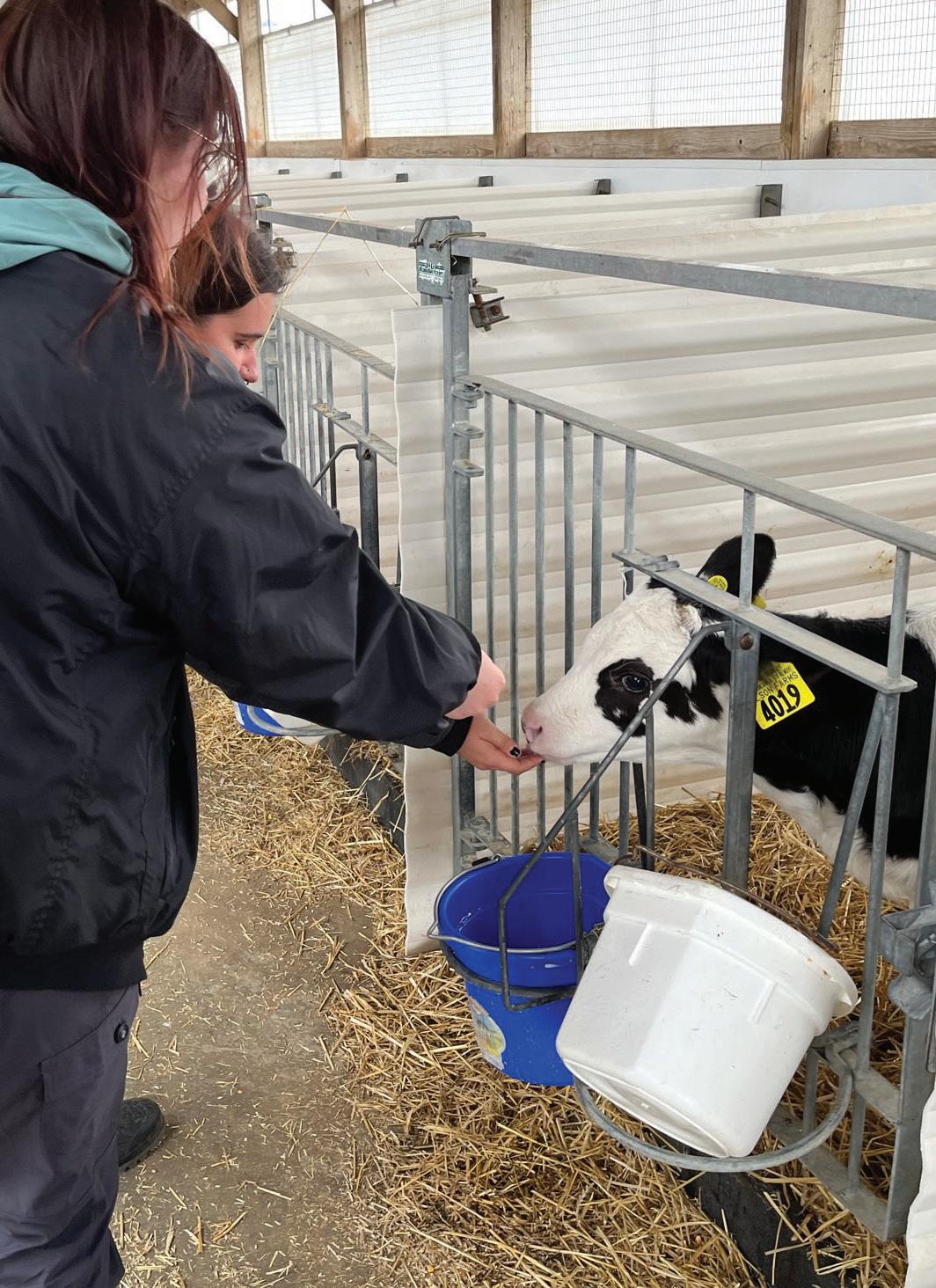
One of the first courses developed with Freshwater Collaborative funding was “Introduction to Freshwater Sciences.” This foundational course is now taught at UW-La Crosse, UW-Madison, UW-Milwaukee, UW Oshkosh and UW-Parkside. The course was built around a series of curated case studies that allow each campus to customize the experience for their students.


Faculty from UW-Eau Claire, UW Oshkosh, UW-River Falls and UW-Stout joined forces to create a two-week advanced course that immerses undergraduate students in field work applicable to many jobs.
Entering its third year in 2024, “Freshwater Field Studies in Western Wisconsin” attracts students from throughout the state. They learn field and laboratory skills used to assess freshwater science investigations in geology, biology, geography and agriculture.
For example, in 2023, students conducted a remote sensing analysis on Lake Menomin and then used what they learned to analyze a body of water near their hometown or where they vacation in the summer. They also learned about wetlands and how they are integrated with groundwater, stormwater, soils and surface waters.
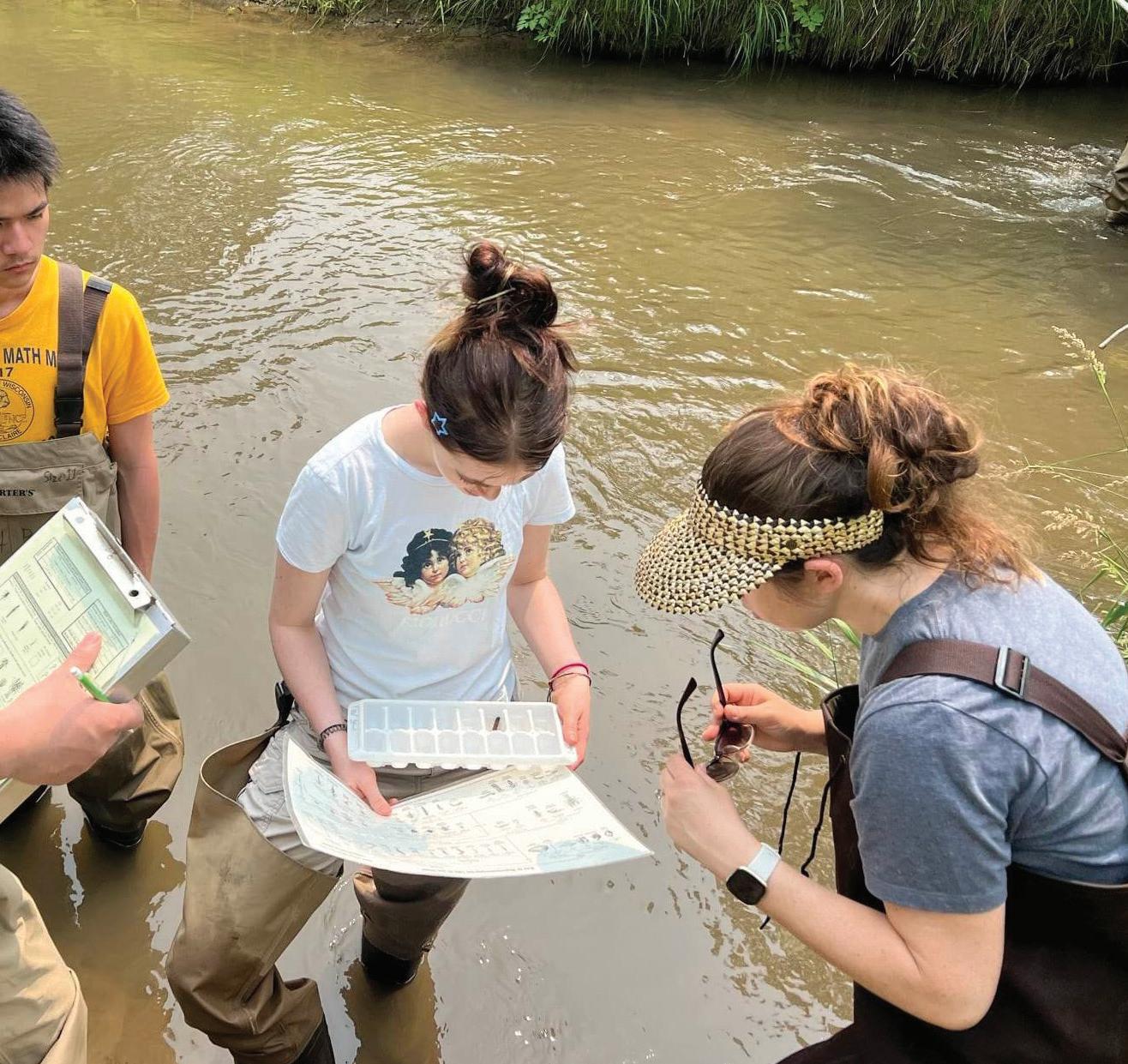
The amount of hands-on experience really prepares you for working and collecting data in the field. All the knowledge I gained from this class at least doubled the list of skills on my resume and allowed me to discover my passion for protecting our state’s ground and surface water.”
Abbigale Coffin , UW-Eau Claire Environmental Biology and Ecology Major (photo top left)
The four universities also partner to offer freshwater experiences to high school students.
UW-Superior offers the only undergraduate courses in the state focused on port and terminal management and marine transportation management. With funding, the university updated two advanced level courses to include information on alternative marine fuels and cold ironing in ports, the impacts of climate change on Great Lakes ice formation, as well as the Wisconsin Public Trust Doctrine, gentrification and more.
The enhancements will help recruit talented students and better educate them to operate maritime facilities on Wisconsin’s lakes and rivers in a sustainable manner.
Through collaborative undergraduate research and internships, students put their classroom learning to work. Funded projects are designed to train students for the workforce and address the 10 Grand Water Challenges.
The program provided me many opportunities for professional development. I gained insight into grad school and got to learn about career opportunities with federal employment. I am so thankful for the Freshwater Program and all the knowledge and experiences it provided me!”
Kara Eppard, Bridgewater College in Virginia
Conducted Research at UW-Madison with USGS
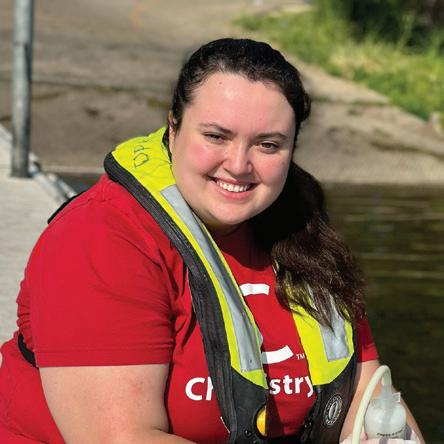
Freshwater@UW leveraged the existing infrastructure of UW-Madison’s successful graduate research program to create undergraduate opportunities at all of the 13 Universities of Wisconsin.
Since 2022, 40 students have participated, with applicants hailing from 30 states and Puerto Rico. Students have worked on research projects at UW-Eau Claire, UW-Green Bay, UWLa Crosse, UW-Madison, UW-Milwaukee, UW Oshkosh, and UWSuperior. Funding for student stipends, housing and meals is provided by the Freshwater Collaborative, Wisconsin Sea Grant, the UW Water Resources Institute and Water@UW-Madison.
• Work closely with research faculty and staff at a UW campus
• Develop research skills, knowledge and abilities
• Learn how to communicate their science to the public
• Present their work at a capstone symposium
• Learn about graduate school, career paths and other postgraduate opportunities
A record 100 applicants applied for the summer 2024 research spots — double the number of applicants in 2023 — and 35 students will be placed.
Lakes teeming with blue-green algae are common in agricultural areas like the Red Cedar Watershed. Universities of Wisconsin students are providing valuable monitoring information to show whether phosphorus remediation strategies are working.
Led by UW-Stout, the Red Cedar Basin Monitoring Group brings together faculty and students from UW-Eau Claire, UW Oshkosh, and UW-River Falls to work directly with local partners. Local high school and middle school students are also involved in sampling.
In 2023, the group collaborated with the City of Menomonie to conduct water and restoration monitoring on the Galloway Creek restoration site, provided technical information for the newly formed Tainter Lake District’s remediation plans, and worked with Dunn County Land and Water Conservation on ways to improve monitoring efforts for soil best management practices.
The hands-on training for students combined with the ability to provide consistent watershed monitoring is a win for Wisconsin — and is leading to more collaborations and training.
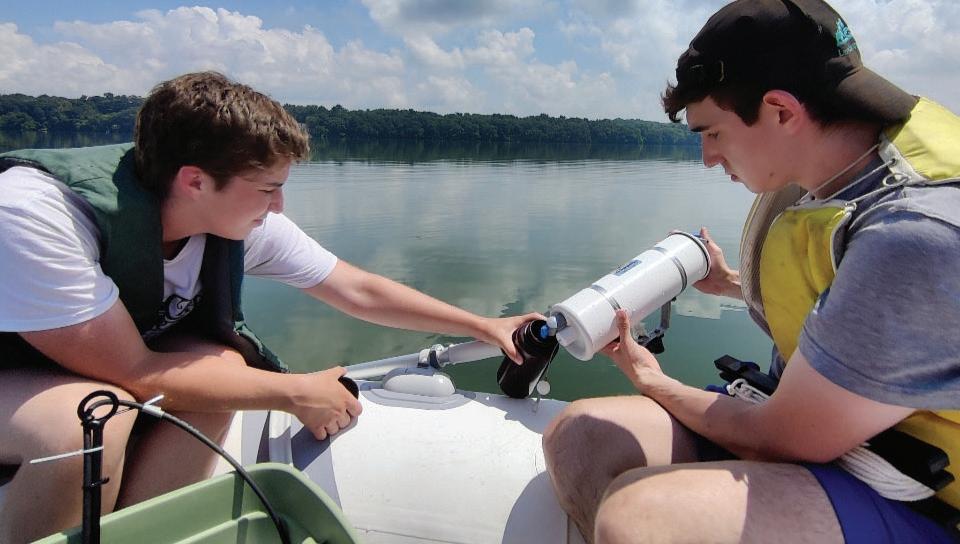
This experience has given me many valuable skills that will help me reach my goals. I feel very confident with the amount of work experience that I’ve gained through this project, particularly from conducting both field work and lab work, and am excited to enter the workforce and continue working on meaningful research projects like this one.”
Kal Breeden, UW-Stout Environmental Science Major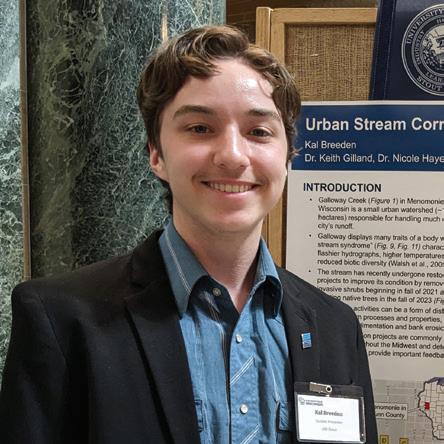
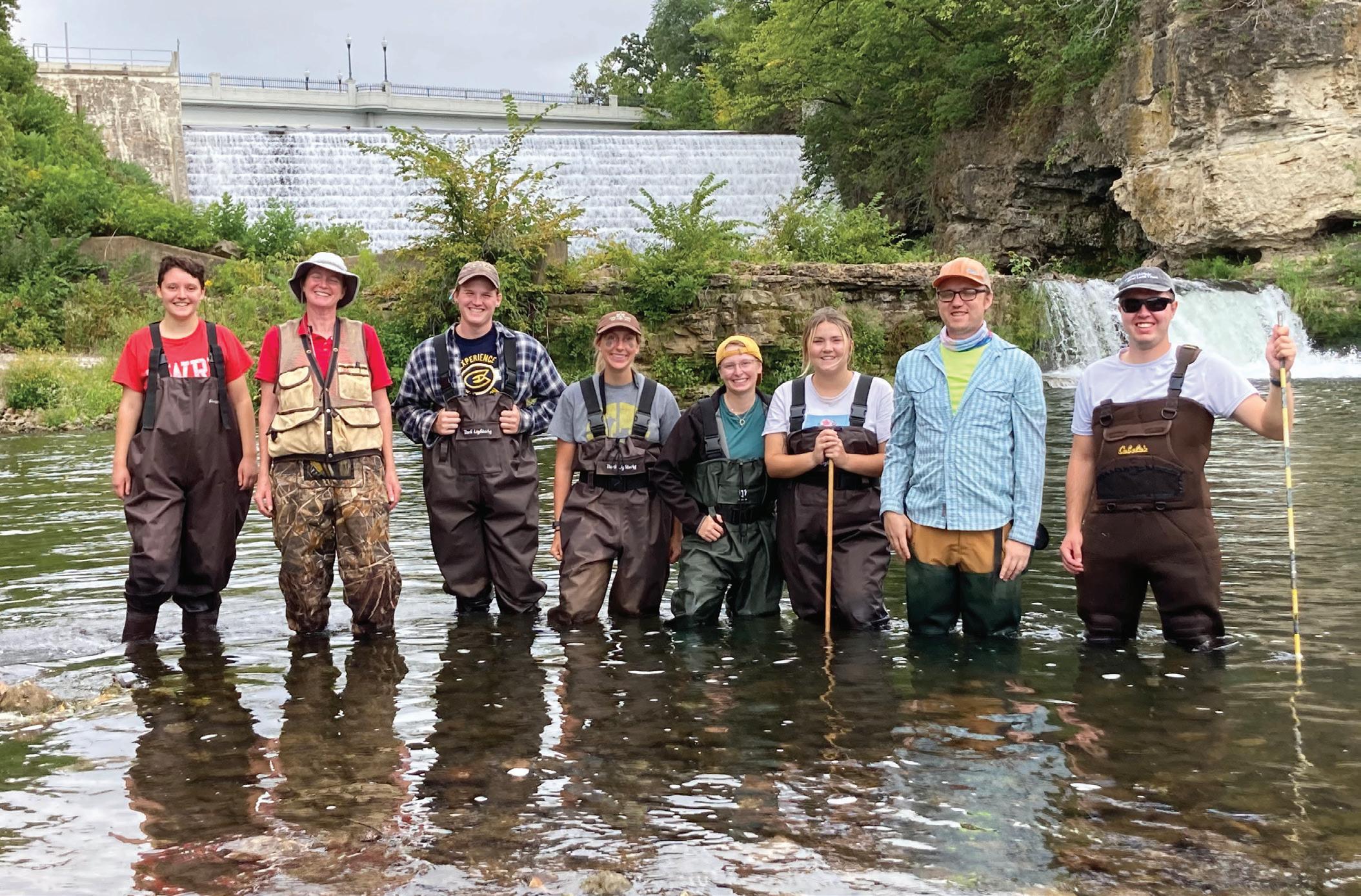
When the River Falls community decided to remove the dams on the Kinnickinnic River, the Kiap-TU-Wish chapter of Trout Unlimited and Inter-Fluve, a firm specializing in river restoration, developed an extensive 10-year monitoring plan for the project. The plan was provided to the City of River Falls and the Kinni Corridor Collaborative, a nonprofit that is leading fundraising efforts for the dam removal and river restoration work. Due to budget constraints, the plan relied upon volunteers to conduct the monitoring, which
created potential challenges in terms of reliability, consistency of the data integrity and the ability to provide long-term monitoring.
Enter the DAM Crew, a two-week summer experience during which working professionals train 12 undergraduates per summer in monitoring techniques to supply data to the Kinni River Monitoring Plan dataset. Two interns are also hired to work on the project throughout the academic year. Students present findings to the public and build their professional networks.
Not only is the DAM Crew open to students from any UW institution, but activities intersect with multiple other Freshwater Collaborative–funded programs in western Wisconsin, thereby leveraging faculty and resources to create a suite of transformative experiences for students.
Water Security, Protection and Resilience
Great Lakes Management, Protection and Restoration
Aquaculture, Aquaponics and Water Food Systems
Industrial Water Engineering and Technology
Water Infrastructure: Collection, Distribution, Treatment
Agricultural Water Management
Water Quality Safety and Emerging Contaminants
Water Business, Law and Finance
Healthy Recreational and Transportation Water Use
Undergraduate research funded by the Freshwater Collaborative focuses on the 10 Grand Water Challenges facing Wisconsin, with priority placed on Agricultural Water Management, and Water Quality Safety and Emerging Contaminants.
Watershed Management and Restoration
A record 16 Freshwater Collaborative-funded research projects were featured at the 2024 Research in the Rotunda. The event provides legislators and the public the opportunity to learn about undergraduate research going on throughout the state.


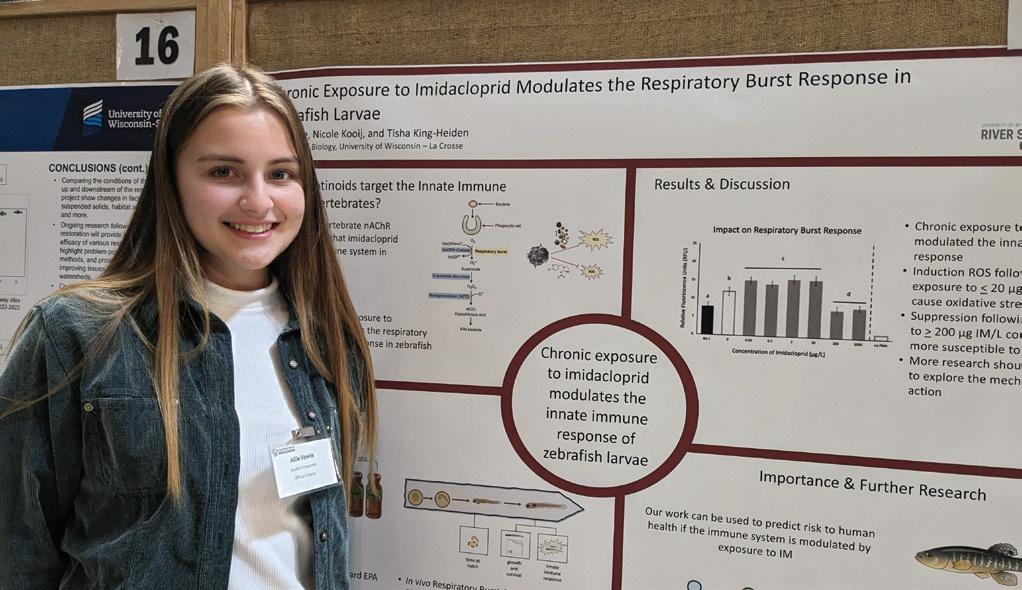
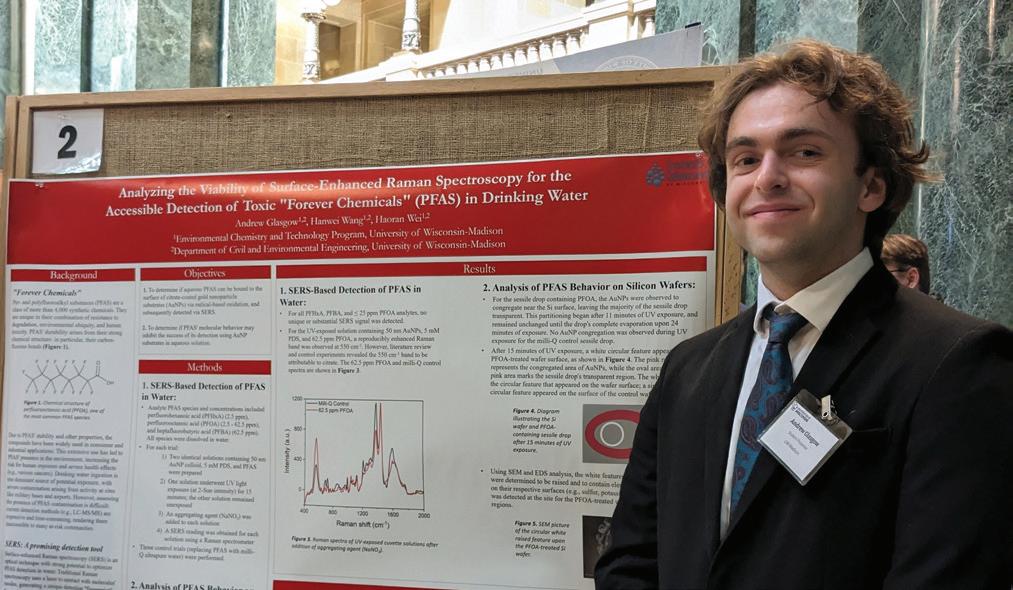


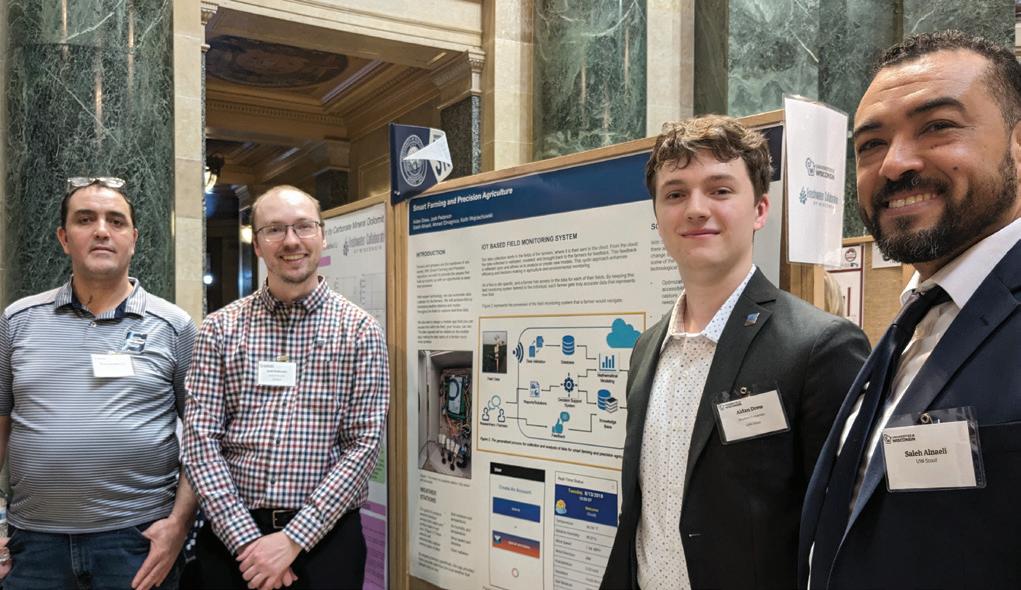
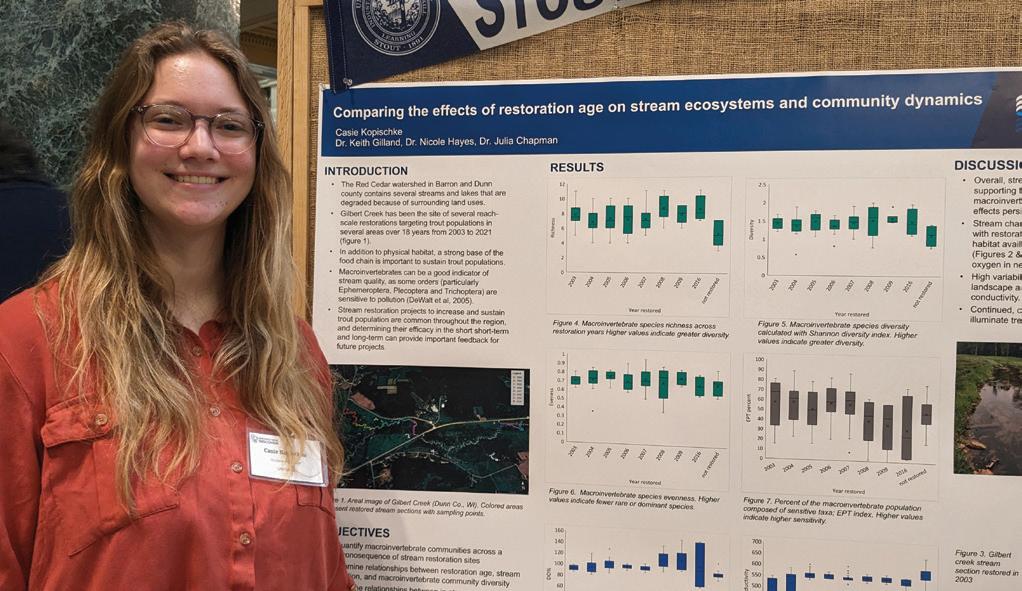






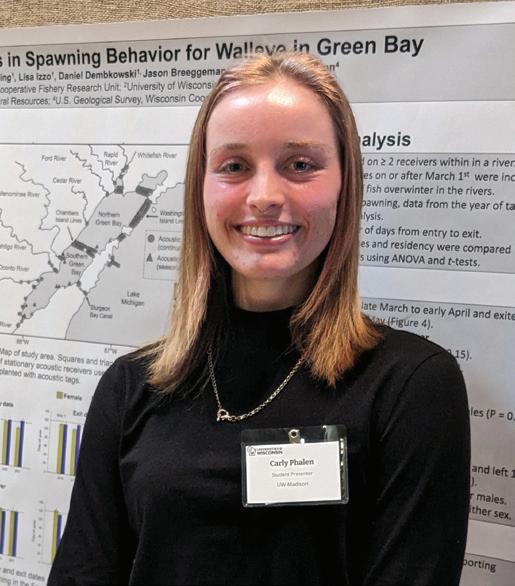
Students share their stories.
The Freshwater Collaborative fosters connections that help build a highly skilled workforce, protect our water systems and position Wisconsin as a global leader in water-related science, technology and economic growth.
Through unique partnerships and in-person and virtual events, the Freshwater Collaborative is expanding the capacity for the Universities of Wisconsin to collaborate with partners in industry, government, nonprofits, tribal nations and the community.
UW Oshkosh is a Wisconsin-based university, and we’re a Wisconsin-based company. We wanted to craft something that was exciting for both of us. There’s engagement and momentum and that can only bring good things to both sides.”
Cherelle Bishop, Whirl-Pak, Filtration Group Product Engineering Manager
The ERIC lab at UW Oshkosh serves as a research and testing center for environmental health professionals throughout the state — and the lab provides a great resource for training students and working with external partners. With Freshwater Collaborative funding, UW Oshkosh made its classrooms, labs, water sampling equipment and research boats available free of charge to UW faculty and staff to use for class outings and research.
In 2023, 34 students participated in the ERIC’s water-centric training from UW-Eau Claire, UW-Madison, UW Oshkosh, UW-River Falls, UW-Stout, UW-Stevens Point and seven non-UW campuses. Students had opportunities to work with organizations such as the EPA, Wisconsin Coastal Management, NOAA, Vilas County Environmental Health Program and Vilas County Health Department.
Additionally, 16 students collaborated with eight lake organizations to conduct aquatic and invasive species outreach and education throughout Vilas County. Another four students were summer interns at the ERIC lab.
The campus also conducted freshwater programming for 134 high schoolers and hosted a South Korean group of students.
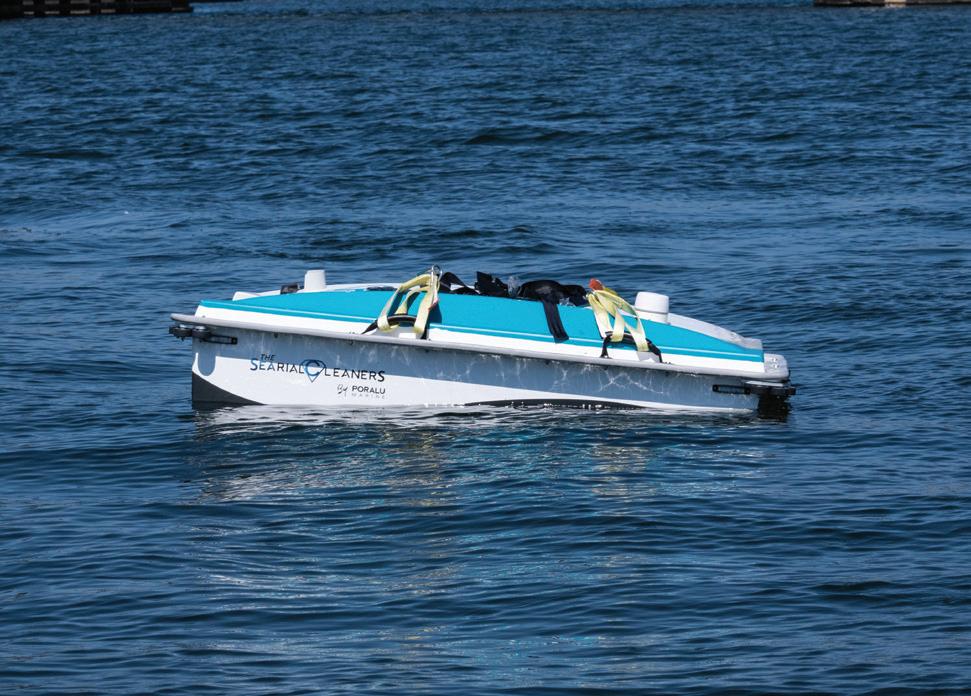
The UW Oshkosh Water Enterprise Program encourages faculty and staff to explore innovative collaborations with external partners. Three such projects took place in 2023, including one with Wisconsin-based Whirl-Pak.
Undergraduate and graduate students are conducting lab testing and analysis on WhirlPak’s sample collection bags to help the company expand its reach. The partnership provides valuable work experience to students, helps solve a business challenge, and may reduce pollution.
The Freshwater Collaborative and UW Oshkosh also partnered with Jacobs Engineering to hire UW students to identify the location and material of service lines in Wisconsin so the state can meet deadlines for the federal Lead and Copper Rule Revisions. Students from 10 Universities of Wisconsin campuses are working with Jacobs staff, local government entities and public utilities to conduct data collection and field work.
The Freshwater Collaborative hosted a quarterly online water symposium series in 2023 in partnership with the Great Lakes Higher Education Consortium and Council of the Great Lakes Region. These events share science with researchers, governmental agencies and nonprofits in the United States and Canadian provinces bordering the Great Lakes. More than 450 people have attended one or more of the events.
Topics have included:
• Groundwater Policy Developments
• Protecting Wetlands Post Sackett Decision
• PFAS, Public Health and Policy
• The Impact of Phosphorus Rules
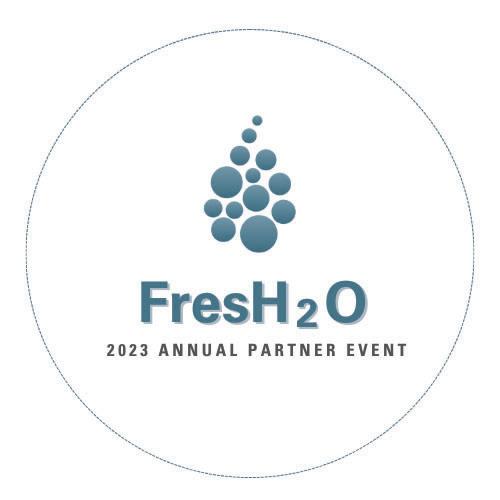
The inaugural FresH 2 O Partner Event in September 2023 brought together Universities of Wisconsin faculty and staff and partners from industry, government agencies and nonprofits to discuss issues such as PFAS, phosphorus pollution, collaborative water research and how to enhance the pipeline to jobs in water industries. More than 110 people registered for the event.
Key takeaways included:
• Attendees would like the Freshwater Collaborative to be a statewide point of contact for academic partners, industry partners, K-12 teachers, government agencies and others to help them connect on research, internships/hiring and other collaborations.
• Additional funding is needed for research, especially for emerging and urgent issues.
• There is a need to advance statewide research agendas for PFAS and phosphorus.
In response, the Freshwater Collaborative has launched Collaboration Groups for PFAS and phosphorus, with the goal of creating a training and communications hub for stakeholders invested in these topics.
Want to know more about our resources for partners? Visit our Partner Resource page.
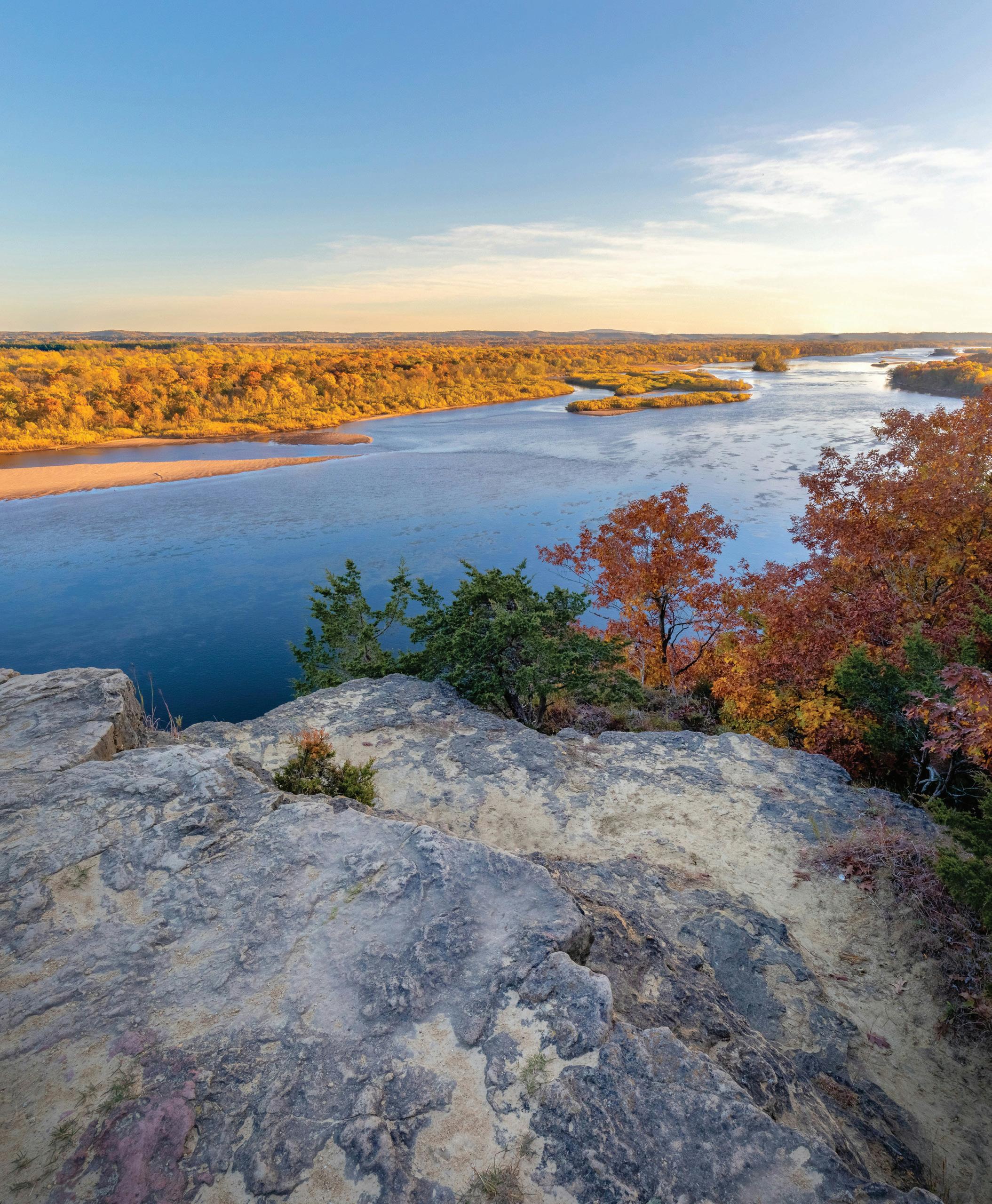
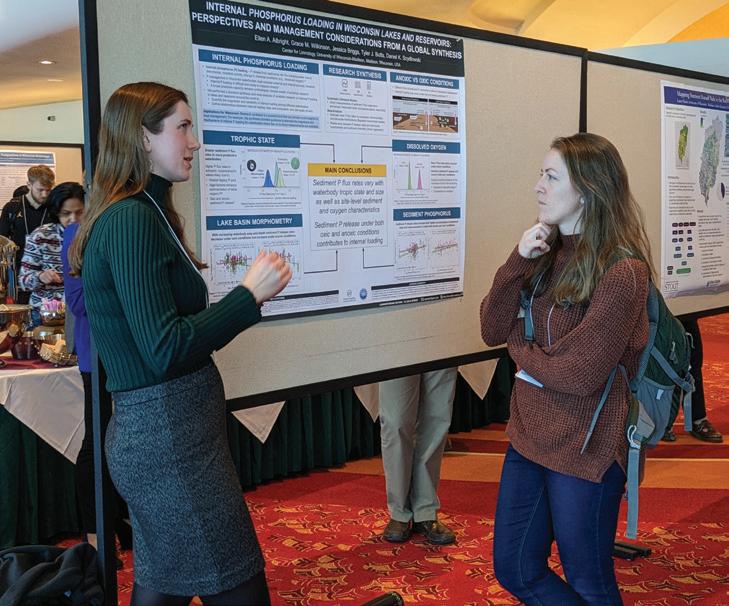
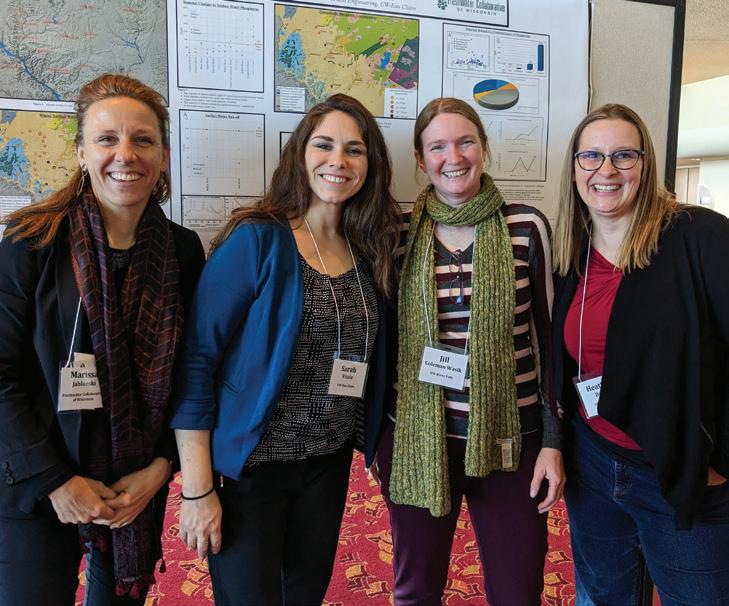

Phosphorus plays a critical role in farm productivity, but overreliance on this fertilizing nutrient has alarming consequences, such as toxic algal blooms and dead zones caused by phosphorus pollution in our waterways.
In February 2023, the UW-Milwaukee Center for Water Policy, with support from the Freshwater Collaborative, the Palmer Foundation and the UW System Water Policy Network, hosted a statewide conference on Wisconsin’s phosphorus standards. More than 200 academic researchers, agricultural/conservation professionals/agencies, farmers/producers, policymakers and community members attended.
The event included an overview of phosphorus regulations, academic presentations on phosphorus-related research projects, and case studies from regulated entities, producers and farmers. The resulting report includes an academic research agenda with research gaps and questions for Universities of Wisconsin researchers to answer in the next decade and policy recommendations for reducing phosphorus pollution and improving water quality in Wisconsin.
The Freshwater Collaborative hosted a follow-up Great Lakes Freshwater Symposium to present key takeaways from the conference. More than 125 people from Canadian and American universities, government agencies and nonprofits registered for the online event.
PFAS are an increasing community concern that threatens citizens in Wisconsin and nationally.
These synthetic “forever” chemicals are used in a wide variety of applications from nonstick cookware to firefighting foams. Exposure has been linked to serious health effects.
Conversations with partners indicate a strong need for a research communications hub around PFAS. The Freshwater Collaborative has initiated a PFAS Collaboration Group to bring together stakeholders for virtual and in-person conversations.
To help address the need for more research into prevention and remediation of this emerging contaminant, the Freshwater Collaborative funded six new PFAS research projects in 2023 that involve faculty and students at UW-Green Bay, UWMadison, UW-Milwaukee, UW-Platteville, UW-Parkside and UW-Stevens Point.
The Freshwater Collaborative provided funding for the Center for Water Policy at UWMilwaukee to create and lead the UW System Water Policy Network, in collaboration with faculty and staff from UWEau Claire, UW-Madison, UW Oshkosh and UW-Stout. Members share ideas, leverage research methods, collaborate on research proposals, and develop water policy curricula for use across the Universities of Wisconsin. They also host presentations and discussions for stakeholders, including the statewide phosphorus conference in 2023. Annually, the Center for Water Policy funds a water policy scholar from among the network members to work on policy issues related to one of Wisconsin’s 10 Grand Challenges.
Since its first convening in 2021, the network has become a hub for those interested in water policy to easily identify collaborators for grants, guest lectures, public speaking, media interviews, etc.
Read more about members of the network.
One of the goals of the Freshwater Collaborative is to promote and facilitate collaborations among Universities of Wisconsin faculty, researchers and students with external industry partners, governmental agencies, nonprofit organizations, tribal nations and communities.
More than 200 organizations have participated in or are connected to Freshwater Collaborative–funded projects. Please note, this may not be a comprehensive list as UW institutions continue to grow their partnerships on an ongoing basis.
Aldo Leopold Community School
Alliance for the Great Lakes
Anvil Lake Association
A.O. Smith Corporation
Ashland County Health Department
Atlas Science Center
Badger Meter
Baileys Harbor Ridges Sanctuary Lake Organizations
Baileys Harbor Wastewater Treatment Plant
Bass Lake Association
Bayfield County Health Department
Big Arbor Vitae Lake Association
Big Portage Lake Riparian Owners Association
Big Sand Lake Association
Big St. Germain Area Lakes District
Buffalo County Health Department
Butternut-Franklin Lake Association
Cardinal Glass
Cargill
Carpenter Nature Center
C.H. Koch Plumbing & Heating LLC
Chippewa Valley Bean
Cia Siab Inc.
Cisco Chain Riparian Owners Association
City of La Crosse
City of Menomonie
City of Oshkosh
City of Racine Health Department
Clean Lakes Alliance
Coastal Municipalities:
• Algoma
• Green Bay
• Kenosha
• Kewaunee
• Manitowoc
• Milwaukee
• Port Washington
• Racine
• Sheboygan
• Two Rivers
College of Menominee Nation
Council of the Great Lakes Region
Country Water Works
Covia Sand Plant
Crossroads at Big Creek
Crystal Lake Association
C. Sweeting Plumbing
Cudahy Public Works Department
Department of Agriculture, Trade and Consumer Protection
De Pere High School
doc | UWM Film
Door County Health Department
Dubuque River Museum & Aquarium
Dunn County Land and Water Conservation
Eagle Creek Renewable Energy
Eagle Lake Management District
Egg Harbor Marina
Effigy Mounds National Monument of Engineers
F3
Farmers Union of Wisconsin
The Farmory Inc.
Fence Lake Association
Fifth Ward Brewing Company
Florence County Health Department
Flow Project
Fond du Lac County Health Department
Food Safety Workshop
Forest Lake Preservation District
Forest to Brook
Found Lake Property Owners Association
Fox Wolf Watershed Alliance
GEI Consultants
Girl Scouts
Glacial Lakes Conservancy
Glendale Public Works Department
Great Lakes Higher Education Consortium
Great Northern Corporation
Green Bay Sewerage
Metropolitan District
Harbor District Inc.
Hope Restores
Howard-Sauamico Weyawega High School
Ice Age Trail Alliance
Indigenous People’s Task Force (Ikidowin)
Iron County Health Department
Island Outdoors
Jacobs Engineering
J. Rasmussen Plumbing
Kentucky Lake Protection & Rehabilitation District
Kewaunee County Health Department
Kinni Corridor Collaborative
Kinnickinnic River Land Trust
Koken Farms
Kurt Zentner & Sons Inc.
La Crosse Queen Cruises
Lafayette County Health Department
Lake Altoona Lake Association
Lake Express
Lake Lorraine Lake Association
Lake Michigan Commercial Fishing Board
Lakeshore Natural Resource Partnership
Lake Superior National Estuarine Research Reserve
Lancaster Public Library
Lincoln County Health Department
Little Arbor Vitae Lake Protection & Rehabilitation District
Little St. Germain Lake Protection & Rehabilitation District
Local farms
Long Lake of Phelps Lake District
Lost Lake Protection & Rehabilitation District
Ludwigs Plumbing
Maiden Voyage Tours
Manitowoc County Health Department
Manitowoc Marina
Manitowoc Soil & Water
Marquette University
Mayo Clinic
Memorial High School
Menominee Indian Tribe of Wisconsin
Merten Plumbing and Heating
Michigan Department of Natural Resources
Michigan Hydropower Reform Coalition
Michigan Tech
Milwaukee County Department of Transportation
Milwaukee Metropolitan Sewerage District
Milwaukee Public Museum
Milwaukee Public Works Department
Milwaukee Riverkeeper
Milwaukee World Fest
Mishicot High School
Monroe County Health Department
MP Kelly Plumbing
Mud Lake Association
National Mississippi River Museum & Aquarium
National Oceanic & Atmospheric Administration
Nature Conservancy
Nelson Deer Farm/Rush Canyon Ranch
NEW Water
Nibi Center
NOAA National Marine Sanctuary
Nohr Chapter of Trout Unlimited
NOLS (National Outdoor Leadership School)
Northeast Wisconsin Land Trust
North High School
North & South Twin Lakes Protection & Rehabilitation District
North Woods & Waters of the St. Croix Heritage Area
Oneida County Health Department
Parker Lake Association
Pentair
Pine Lake Association
Racine County Public Health Division
Ramboll
Red Smith Middle School
The Renaissance Academy
River Alliance of Wisconsin
Riveredge Nature Center
Rock River Partnership
Root River Environmental Education Community Center
Sammons Plumbing
Sawyer County Health & Human Services
Science Museum of Minnesota
Skyline Construction
Smoky Lake Preservation Association
South Bay Marina
Southeastern Wisconsin Regional Planning Commission (SEWRPC)
Southeastern Wisconsin Watershed Trust
St. Croix Watershed Stewards
Stantec
Steinthal Lodge
Sustainable Phosphorus Alliance
Tainter Lake Districts
Taylor County Health Department
Tomahawk Boy Scout Camp
Town of Boulder Junction
Town of Gays Mills
Town of Plum Lake
Trout Unlimited
University School of Milwaukee
Upper Midwest Water Science Center of the USGS
Urban Ecology Center
U.S. Army Corps of Engineers
U.S. Geological Survey
UW-Madison Office of Tribal Relations
Veolia
Vernon County Health Department
Vilas County Health Department
Walter Plumbing LLC
Washington Ozaukee Public Health Department
Water Quality Investigations
Watertech of America
Waupaca County Public Health Department
We Energies
Wellntel
Whirl-Pak
White Sand Lake Association
Whitewater Lake Association
Winnebago Mental Health Institute
Winnebago County Health Department
Wisconsin Cooperative Fishery Research Unit
Wisconsin Department of Natural Resources
• Drinking Water & Groundwater
• Great Waters
• Water Quality
Wisconsin Economic Development Corporation
Wisconsin Historical Society
Wisconsin Public Service
Wisconsin Sea Grant
Wisconsin State Capitol staff
Wood County Health Department
Woodland Dunes
WUWM, Wisconsin Public Radio
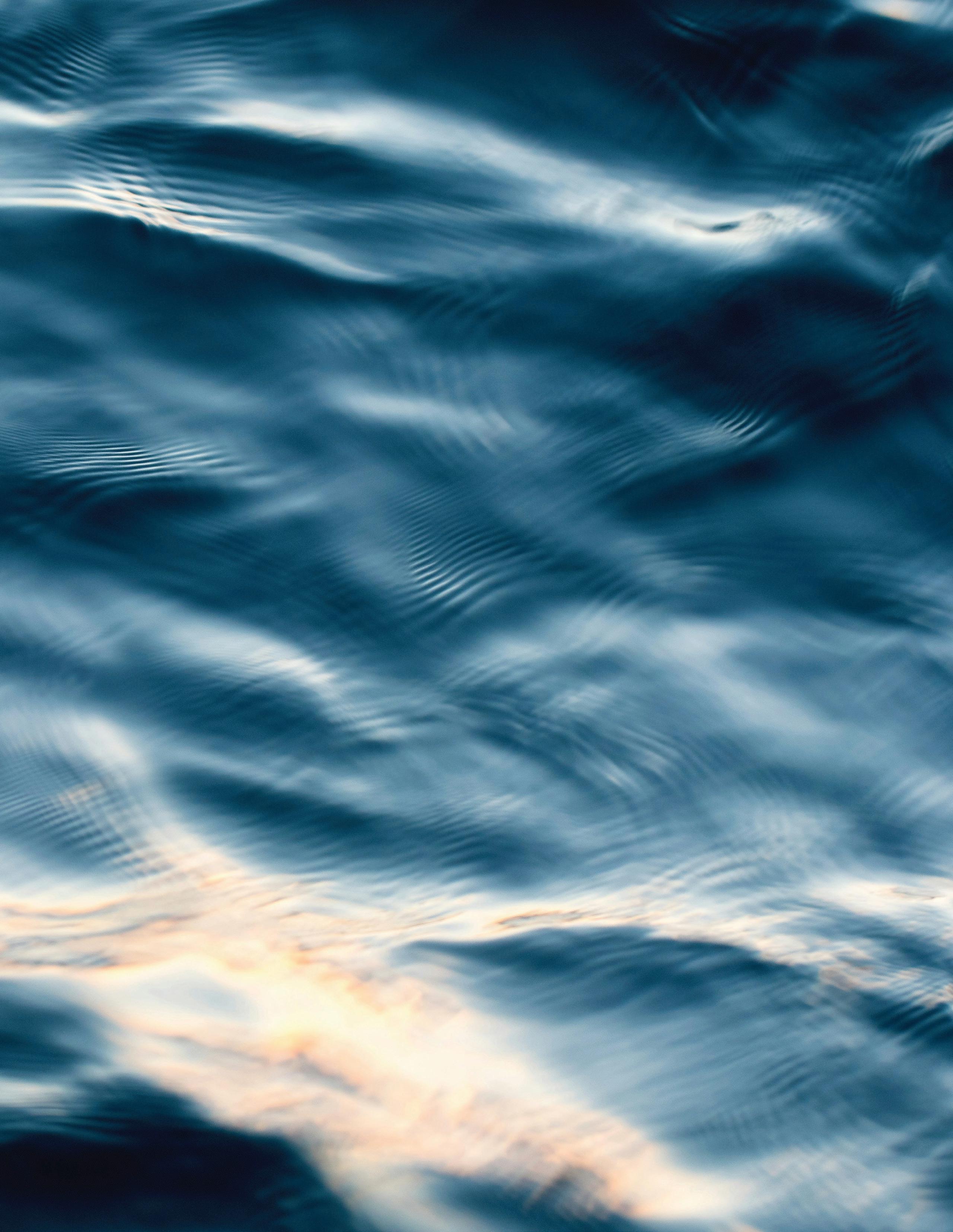
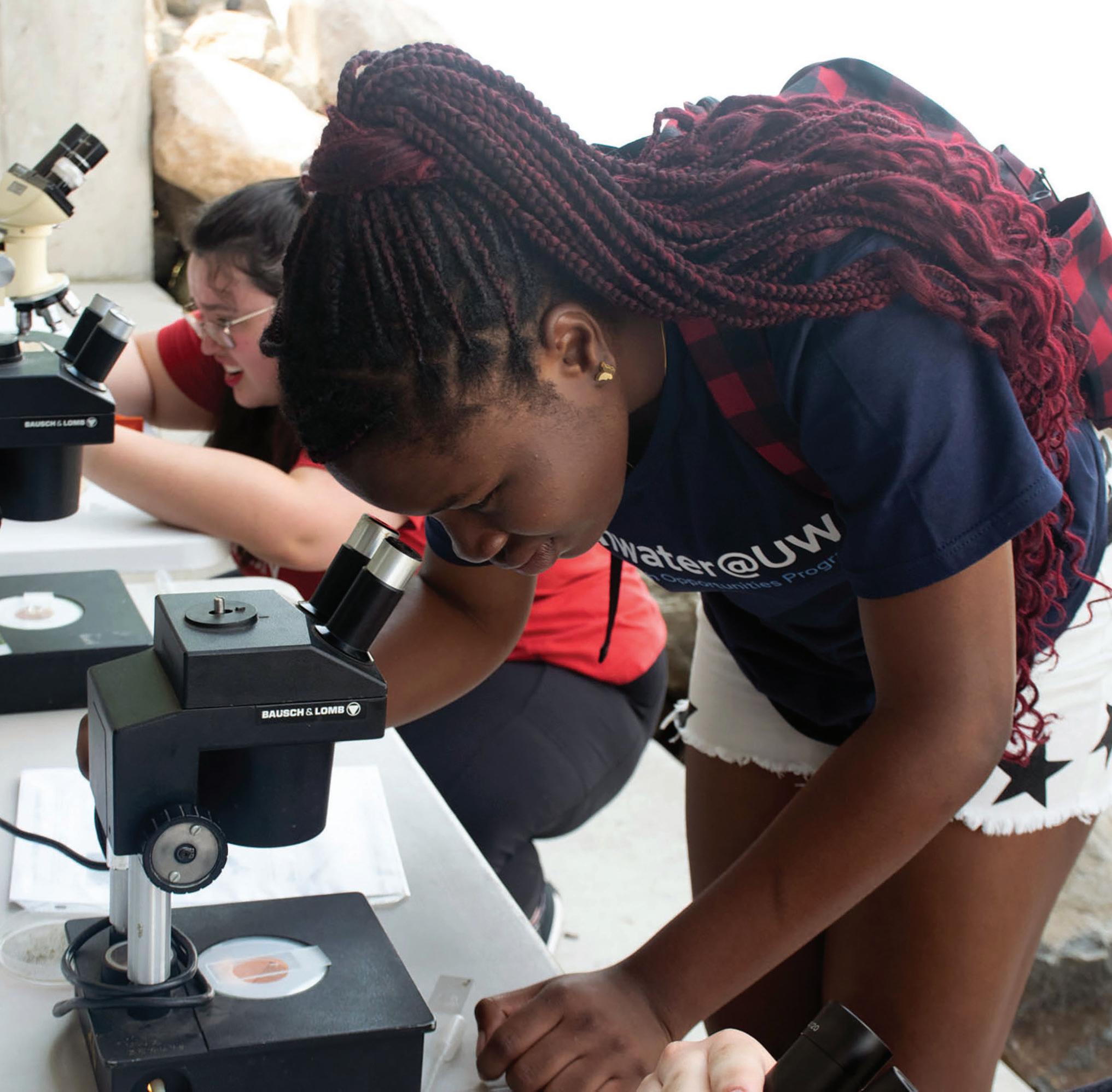
The Freshwater Collaborative of Wisconsin is funded by the Wisconsin State Legislature and is evaluated annually by Socially Responsible Evaluation in Education (SREed), a research and evaluation group at UWMilwaukee that partners with education agencies to promote system change and improve educational equity for students from all backgrounds.